ISLAMABAD: The Election Commission of Pakistan (ECP) said on Tuesday it would conduct March 3 senate polls through secret ballot, though it also established a special monitoring cell at its secretariat to identify any corrupt practices in the elections.
The ECP made the announcement after the country’s top court encouraged it to use technology to make the electoral contest as fair as possible.
Following the apex court’s opinion in response to a presidential reference, the commission constituted a three-member committee to prepare recommendations for the use of technology in the Senate elections.
The committee will finalize its recommendations within four weeks, the ECP said in a statement on Tuesday.
“The commission also decided that due to time constraint, ensuing Senate elections scheduled for March 3, 2021 will be conducted as provided in the constitution and law as per past practice,” it said.
Prime Minister Imran Khan’s government sought the apex court’s opinion through a presidential reference filed on December 23, 2020, asking if voting in senate polls could be held through open ballot.
After several court proceedings, the Supreme Court said it was the ECP’s job to ensure transparent senate polls.
The commission said on Tuesday it had taken numerous steps to ensure transparency in Senate elections including publicizing its email addresses and phone numbers and requesting the general public and all relevant institutions to register complaints in case of any malpractice in the polls.
The electoral body said it had established a vigilance committee, a complaint management system and a special monitoring cell to curb any corrupt practices in the polls.
The chief election commissioner also held a meeting with heads of Federal Investigation Agency (FIA), National Database and Registration Authority (Nadra) and Pakistan Telecommunication Authority (PTA) to seek their suggestions in how to hold fair and free elections.
The commission directed all relevant agencies and organizations to remain vigilant and inform the election commission for early legal action in case of any illegality in the polls.
Lawmakers in the national and provincial assemblies constitute the electoral college and vote for 48 Senators. Each member of the Upper House of Parliament is elected for a six-year term. Half of the senate members retire after every three years and new ones are elected. The house has equal representation from all four provinces.
Political and legal experts said the election commission should use its authority to restore public trust in the transparency of the senate and general elections.
“Secret voting in senate elections gives legislators an option to decide as per their conscience, instead of just casting their votes in favor of their party candidates,” Ahmed Bilal Mehboob, president of the Pakistan Institute of Legislative Development and Transparency (PILDAT), told Arab News.
He said that political leadership should focus on introducing democracy within their parties and make decisions through consultation instead of forcing decisions on their members.
“If the parties select candidates through a democratic process, the issue of corruption in Senate elections will die down to a large extent,” he said.
Barrister Saad Rasool, an expert on election laws, said transparency in the polls could not be ensured unless the election commission takes action against those who violate the campaign finance laws.
“We cannot achieve true democracy in Pakistan if we continue to allow wealthy and influential candidates to trample the election finance laws,” he told Arab News. “It is the responsibility of the election commission to provide a level playing field to all contesting candidates.”
Pakistan election commission establishes monitoring cell to curb corrupt practice in senate polls
https://arab.news/7mjuc
Pakistan election commission establishes monitoring cell to curb corrupt practice in senate polls
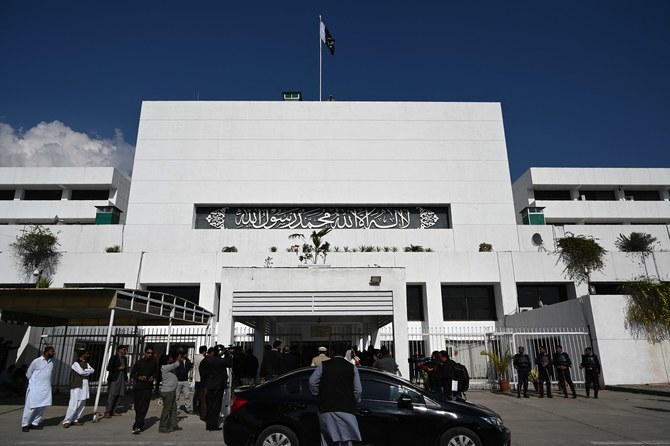
- Commission has established a three-member committee to finalize recommendations for use of technology in senate elections
- Legal experts say the commission must enforce campaign finance laws to allow level playing field to all candidates
Pakistani forces kill 6 militants in volatile northwest near Afghanistan— army

- Pakistani security forces carry out twin raids in Dera Ismail Khan, North Waziristan districts
- Such operations are often conducted against Pakistani Taliban or Tehreek-e-Taliban Pakistan group
PESHAWAR, Pakistan: Pakistani security forces killed six militants in twin raids Wednesday targeting their hideouts in the country’s volatile northwest region bordering Afghanistan, the military said.
Five militants were killed in the first raid in Dera Ismail Khan district in Khyber Pakhtunkhwa province, the military said in a statement. It did not provide further details about the slain insurgents, and only said the men were behind various previous attacks on the security forces.
Another militant was killed in the second raid in a former stronghold of the Pakistani Taliban in the North Waziristan district in the northwest.
The statement did not provide any further details about the identity of the slain men.
Such operations often target the Pakistani Taliban, which has been emboldened by the Taliban takeover of Afghanistan in 2021. Known as the Tehreek-e-Taliban Pakistan or TTP, it is a separate group but a close ally of the Afghan Taliban.
Pakistan hikes electricity prices by Rs2.83 per unit citing fuel cost adjustment
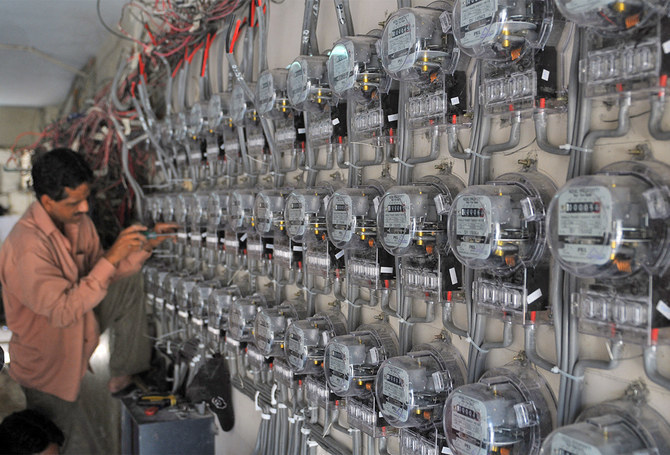
- Fuel cost adjustment for March to reflect in consumers’ bills for the month of May, says power regulator
- Pakistan has been caught in a high inflationary cycle since April 2022 due to surging food and fuel prices
ISLAMABAD: Pakistan’s National Electric Power Regulatory Authority (NEPRA) on Wednesday authorized distribution companies to levy a Rs2.83 per unit additional charge on consumers’ bills for May, with the move likely to fuel inflation in a country already suffering an economic crisis.
A notification by NEPRA seen by Arab News stated that the fuel cost adjustment pertains to March, adding that the additional charges would apply to all consumer categories except “Electric Vehicle Charging Stations (EVCS) and lifeline consumers.”
“The said adjustment shall be shown separately in consumers’ bills on the basis of units billed to the consumer in the month of March 2024,” the notification said.
Pakistan has been caught in a high inflationary spiral since April 2022, with the highest-ever inflation rate recorded at 38 percent in May 2023. The government credits soaring inflation to painful decisions it had to take to meet conditions for an International Monetary Fund (IMF) bailout program, including hiking energy tariffs and fuel prices.
Gas and electricity rates were hiked by 318.7 percent and 73 percent respectively in a year, according to official data.
The price hikes come as Pakistan is set to begin discussions with the IMF this month over a new multi-billion-dollar loan agreement after completing its nine-month, $3 billion loan arrangement with the lender.
Under the last IMF bailout, Pakistan was told to prevent further accumulation of circular debt in its power sector, arising from subsidies and unpaid bills. For a new program, the South Asian nation will need to implement reforms to reduce costs by improving electricity transmission and distribution, moving captive power into the grid, improving governance, and combating theft.
It will also have to maintain power and gas tariffs at levels that ensure cost recovery, with adjustments made to safeguard the financially vulnerable, through existing progressive tariff structures.
Senior World Bank official concludes Pakistan trip after discussing reforms with officials
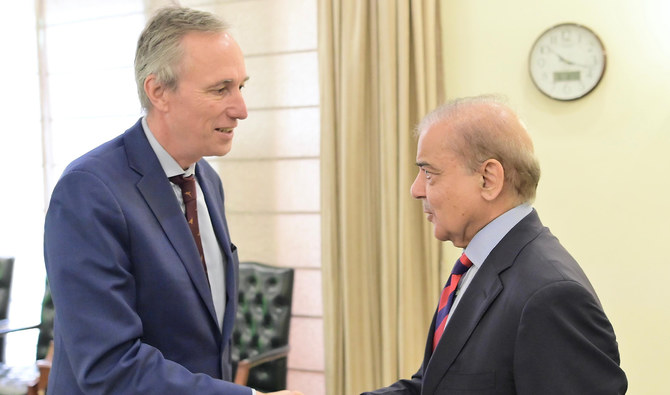
- World Bank Vice President for South Asia Martin Raiser meets PM Sharif, key officials in Islamabad
- Raiser praises Pakistan’s reform plans to boost growth, attract private investment and tackle poverty
ISLAMABAD: A senior World Bank official concluded his three-day visit to Pakistan on Wednesday, holding discussions with Prime Minister Shehbaz Sharif and key government ministers on Islamabad’s fiscal and economic reforms, a statement from the international institution said.
World Bank Vice President for South Asia Martin Raiser arrived in the federal capital on May 6, with his visit taking place as Pakistan faces a chronic balance of payment crisis, forcing it to turn to the International Monetary Fund (IMF) for a new long-term bailout deal.
Pakistan has faced the challenges of revenue generation and government expenditure in the past and struggled with high levels of debt, a large fiscal deficit and an ongoing need for structural reforms to improve its fiscal sustainability.
“The World Bank Vice President for South Asia, Martin Raiser, concluded his three-day visit to Pakistan today and reaffirmed the World Bank’s support to stabilize the economy and accelerate inclusive and resilient growth,” a press release by the international institution read.
It said Raiser met Sharif, ministers of finance, water, power, energy, and petroleum, and his counterparts to discuss Pakistan’s development priorities.
“The discussions focused on economic and fiscal reforms, human capital development, adaptation to climate change, energy sector reforms, and digitalization as a foundational enabler and accelerator of development,” the World Bank added. \
Raiser said he was pleased to learn of Pakistan’s reform plans to boost growth and attract private investment, strengthen climate resilience, and invest in human capital to tackle daunting challenges such as child stunting and poverty.
The World Bank official also visited Pakistan’s northwestern Khyber Pakhtunkhwa (KP) province to meet Chief Minister Ali Amin Gandapur.
“Discussions focused on the provincial developmental priorities and how can the World Bank step up its support in key sectors, like education, water and sanitation, health, rural roads, and livelihoods,” the statement said.
He also attended a national conference on education in Islamabad, where PM Sharif also spoke. Raiser reaffirmed the World Bank’s commitment to urgent action to tackle the large number of out-of-school children in Pakistan.
PM Sharif declares ‘education emergency’ across Pakistan to enroll out-of-school children
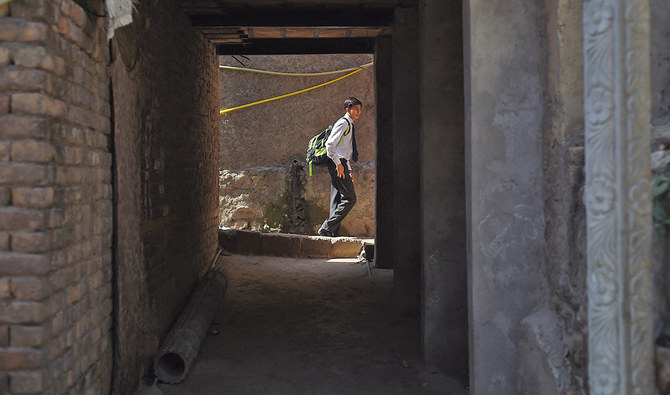
- Pakistan has one of the world’s highest out-of-school children population at 26.2 million
- PM Shehbaz Sharif says will personally oversee the national program to ensure its success
ISLAMABAD: Prime Minister Shehbaz Sharif on Wednesday declared an “education emergency” across Pakistan on Wednesday, vowing to personally oversee the program which he hoped would enroll over 26.2 million out-of-school children in educational institutions.
Pakistan has the second-highest population of out-of-school children in the world at 26.2 million, according to Unicef Pakistan. Pakistani experts have identified population growth, lack of localized strategies, and economic issues as the main reasons why over 26 million Pakistani children are not enrolled in schools across the country.
A report by Pakistan’s education ministry in January revealed that out of 26.2 million out-of-school children, 11.73 million are in Punjab, 7.63 million in Sindh, 3.63 million in Khyber Pakhtunkhwa (KP) and 3.13 million in Balochistan province.
Speaking at an event titled “National Conference on Education Emergency,” Sharif said enrolling millions of children back into schools was a “tall order” that could be achieved with conviction.
“I declare from this moment an emergency in education all over Pakistan,” Sharif told members of the conference, which included federal ministers, parliamentarians, vice-chancellors, and diplomats.
The Pakistani prime minister said he would personally oversee the national program, adding that he would meet the chief ministers of all four provinces in the country for the sake of Pakistani children and their future.
“This is about our children and our future,” Sharif said. “This is a very challenging task, no doubt. But nations which had faced difficulties and defeat in the past arose from the ashes of defeat.”
He hoped provincial governments in Pakistan would help the center in achieving its goal of promoting education in the country and transforming it into an educated nation.
“I guarantee, if we move in unison to find our space, Pakistan will become one of the most educated societies one day soon,” he remarked.
Pakistan’s first lunar satellite ICUBE-Q successfully enters moon’s orbit
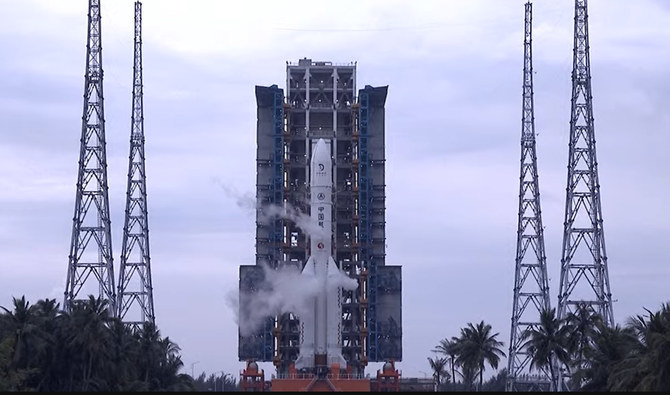
- ICUBE-Q was deployed in moon’s orbit around 1:14 p.m. Pakistan Standard Time, says Institute of Space technology official
- IST official describes development as “important” one for Pakistan allowing it to conduct “bigger” space missions in future
Islamabad: Pakistan’s first lunar satellite ICUBE-Q entered the moon’s orbit successfully today, Wednesday, a senior official of the country’s Institute of Space Technology (IST) confirmed, saying the “important” development could pave the way for “bigger” space missions for the country in the future.
The ICUBE-Qamar satellite carries two optical cameras to image the lunar surface and weighs around 7kg. Cubesats are tiny box-shaped satellites that are mainly launched into low Earth orbit to observe the Earth, test new communications technology, or perform miniature experiments.
Pakistan’s first lunar satellite was launched aboard China’s Chang’e-6 probe on May 3. The Chinese probe is tasked with landing on the far side of the moon, which perpetually faces away from the Earth, after which it will retrieve and return samples. China is the first country to make such an ambitious attempt.
“Our ICUBE-Q was deployed successfully in its orbit at 1:14 p.m. Pakistan Standard Time,” Dr. Khurram Khurshid, the head of the electrical engineering and computer science department at IST and a co-lead on the satellite project, told Arab News.
Dr. Khurshid said Pakistani officials will continue to test the satellite’s system for the next three to four days. He said initial tests revealed there were no complications with the cubesat’s system.
The IST official said the development means Pakistan is officially in an exclusive club of countries that have conducted deep space missions.
“This is the first step, a step in the right direction,” Dr. Khurshid noted. “It can lead to bigger space missions, such as landing on the moon or various other experiments.”
Dr. Khurshid said Pakistan would be able to share images from the satellite by May 15.
Around 100 students from IST contributed to developing the satellite. Pakistan’s proposal to build the satellite was accepted by the China National Space Agency (CNSA) from plans submitted by eight member states of the Asia-Pacific Space Cooperation Organization (APSCO).
The design, development, and qualification of the ICUBE-Q satellite were spearheaded by faculty members and students of the IST in collaboration with China’s Shanghai Jiao Tong University (SJTU), with support from Pakistan’s National Space Agency, SUPARCO.
The ICUBE-Q has two cameras as payload for taking images of the lunar surface that will be transmitted back to Earth for analysis.









